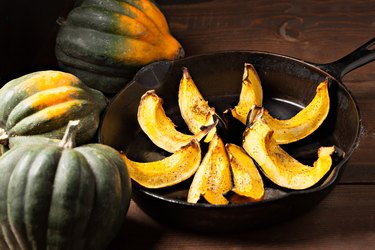
Acorn squash, like other winter squash varieties, keeps far longer than most fresh produce. But because this thick-skinned vegetable can sit on your kitchen counter for weeks without showing the slightest sign of decay, it can be hard to tell when it's past its prime.
Depending how how it's been cooked, prepared and stored, your acorn squash can last up to a year. Here's how to tell if it's ripe or rotten.
Video of the Day
Video of the Day
Related Reading
Whole and Raw Acorn Squash
Whether you pick it up from the market or straight from your garden, the shelf life of an acorn squash is determined by its condition and the conditions you keep it in. A perfectly ripe squash — or one that's heavy for its size, firm and free of soft spots or mold — usually keeps for 1 to 2 months in a cool, dry spot away from direct sunlight.
Acorn squash tends to last longer if it's stored at about 50 degrees Fahrenheit, according to Oregon State University Extension. Storing a whole squash in the refrigerator may seem like a good idea, but temperatures lower than 50 degrees actually make the uncooked vegetable deteriorate faster.
Cooked and Peeled Acorn Squash
If you've had an acorn squash sitting in your pantry for a couple of months and still aren't sure how you want to use it, cooking it will buy you a few extra days. Because its rind is quite thick, raw acorn squash can be difficult to slice.
Instead, pierce the rind all over with a sharp knife and cook the vegetable whole — an average-sized specimen needs about 45 minutes in an oven heated to 400 degrees Fahrenheit or around 12 minutes in a microwave. Once it's cool enough to handle, slice the squash in half, remove its seeds and scoop out the tender flesh.
Whether you leave it in shapeless chunks or cut it into cubes, cooked acorn squash can be refrigerated for up to 3 days in an air-tight container.
Related Reading
Mashed and Frozen Acorn Squash
So you finally decided to plant a vegetable garden, and acorn squash was your bumper crop of the year. After giving some away and finding creative ways to eat one or two a week, you still have more squash than you can consume in two months.
Look no further than your freezer for a solution. Properly prepared acorn squash can be stored in the freezer for up to a year without affecting its quality, according to Michigan State University.
Squash should be cooked, allowed to cool and mashed or pureed before it's frozen in an air-tight, dated container. Your squash will be ready to use after it spends a day or so thawing in the refrigerator.
How to Tell if It's Gone Bad
Like all fresh vegetables, damaged squash decays quickly, so avoid ones that have any cracks or dents. You should also steer clear of squash that have soft or glossy rinds — a soft rind generally indicates watery, flavorless flesh, while glossy rinds are a sign of immature, bitter flesh.
Acorn squash is at its peak when it has a dull, deep green rind splashed with a bit of bright orange. These orange patches typically become larger as the vegetable ages, which is why you should avoid buying a squash that's mostly orange if you don't plan to use it right away.
- Oregon State University Extension: "Storing Pumpkins and Winter Squash at Home"
- Michigan State University: "Michigan Fresh: Using, Storing, and Preserving Winter Squash"
- Aliza Green: "Field Guide to Produce: How to Identify, Select and Prepare Virtually Every Fruit and Vegetable at the Market"
- Sheldon Margen: "Wellness Foods A to Z: An Indispensable Guide for Health-Conscious Food Lovers"
- Michael Murray, N.D.:"Encyclopedia of Healing Foods"